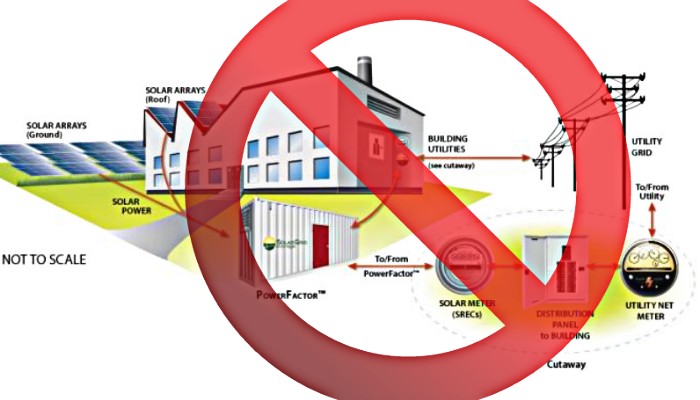Originally published on Planetsave.com
Storing solar energy in a battery in Spain is more criminal than spilling radioactive waste. That’s the implied message written between the lines of a recently drafted law poised for fast-track approval by the government of Spain. Proposed fines for residential and SME use of solar energy self-consumption will be as high as €60 million (US$67.7 million).
Applying to grid-connected solar PV installations of up to 15 kW, Spain’s new “solar tax” will be €8.9 (US$10) per kW for residential consumers, and range up to €36 (US$40.6) per kW for medium size businesses. Off-grid solar installation owners, however, will be permitted to install solar storage units without fear of paying the new tax.
Spain’s “Ideological Campaign Against Solar”
Speaking recently to PV Tech, Union Espanola Fotovoltaico (UNEF), the PV Association of Spain stated that “this would be the only self-consumption law in the world created only to prohibit the development of self-consumption.”
UNEF added that Spain’s new law is “retroactive” because if projects do not fit within the new parameters they will become illegal, even if already legally approved. Specifically, the new law requires that the owner and consumer must be the same person, and installations may no longer exceed 100 kW. Infringements will be treated very seriously, resulting in the maximum fines of up to €60 million (US$67.7 million). This amount is twice as high as the penalty for causing a leak of radioactive waste in Spain, currently set at €30 million (US$33.85 million).
“There is an ideological campaign against solar,” stated UNEF General Director José Donoso, “and a lobby from the utilities, which have a dominant position in the market.”
Solar Hostility Generating Discriminatory Policy
The new levy on solar energy self-consumption from a grid-connected owner’s storage unit will have a seriously negative impact on the solar installation payback period. SMEs using self-consumption are expected to have a lengthening of payback time from four to seven years. PV Tech also notes that taxation on “residential self-consumption of solar energy in Spain could increase payback time from around 16 years to 31 years.”
Calling the new solar tax “discriminatory,” UNEF pointed out that no other energy efficiency measure in Spain, is required to pay this tax. Gas, coal, and nuclear generators self-consume at least 8% of their energy, but are not subject to the tax at all, and self-consumption from cogeneration of electricity and heat is tax-exempt until 2020.
With only around 100 MW of PV self-consumption currently installed in Spain, UNEF notes that, even if this number doubled, “the Government would only generate €6 million (US$6.8 million) from the tax.” However, UNEF calculated that Spain could easily generate €230 million (US$259.5 million) by applying the same penalty for self-consumption to traditional energy plants. Applied to cogeneration, Spain would additionally gain €100 million (US$112.8 million).
UNEF’s Donoso said, “In general terms, all the policies of the Spanish government in the last four years are anti-renewables.”
The Sorely Depressed Solar Industry of Spain
This new law will critically impact the already depressed solar industry, stated Donoso. In the last three years, he explained, Spain has upheld a moratorium against new utility-scale solar PV projects, and has been voicing strong rhetoric against solar self-consumption for the past two years.
In 2014 another solar-hostile bill was passed retroactively limiting returns investors can collect on solar PV projects from July, 2013, and onward into Spain’s bleak renewables future. That controversial bill capped the profits of PV projects at 7.4% before tax, and 5.5% after tax.
Speaking on that occasion last year, Donoso stated, “The Royal Decree approved by the Council of Ministers penalises not only the past but also the future.” Understating the obvious, he added, “With the legal uncertainty that has been created for our country, it will be very difficult in the future to convince investors that come to this area, or only do so with a risk premium that will hurt the competitiveness of technology.”
In 2014, only 22 MW of solar PV was installed in Spain, and today, expectations for 2015 are similar. About this expectation, Donoso notes dryly, “If we are lucky.”
Claims against the newly drafted solar tax law will be taken for less than two weeks, complained Donoso. Then, heaping Spanish insult on top of solar market injury, this latest controversial law will be pushed through for approval in Spain’s State Council.

Picture credits: top) www.solargridstorage.com (edited by A.A.). Bottom) Spain’s infringement fines, from www.pv-tech.org







Ugh, how unbelievably prehistoric…